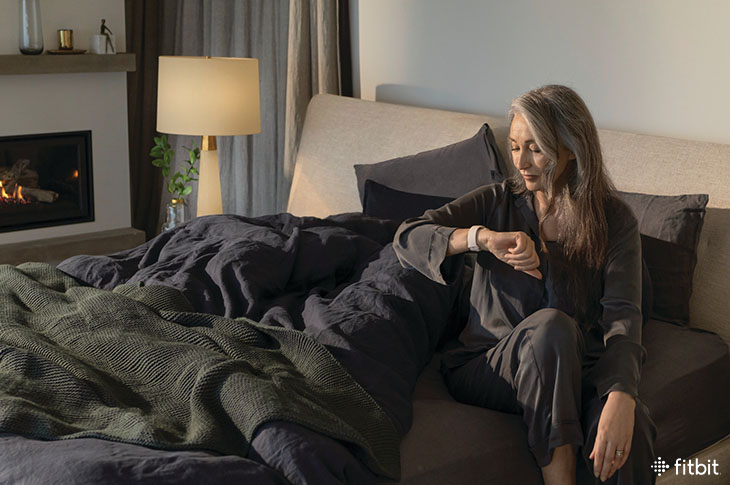
For many, the holiday season is packed with all sorts of excitement, whether that’s flying across the country (or world!) to celebrate with friends and family, hosting a festive cocktail party, or enjoying their favorite treats.
But while the holidays are full of excitement, they’re also full of things that can throw a wrench in your sleep schedule—and by the time the New Year rolls around, you can find yourself dealing with a serious case of post-holiday exhaustion.
So, the question is, how, exactly, does the holiday season mess with your sleep schedule—and, more importantly, what can you do to keep your sleep on track?
Holiday travel
The holidays are one of the biggest travel times of the year. And while catching a plane to celebrate the season with far-off loved ones is inarguably fun and festive, it can also throw your sleep schedule into a tailspin.
“Sleep is regulated by two different systems; the first is the sleep homeostasis process which builds up sleep debt the longer you’re awake, and second is the circadian rhythm, which tells your brain when to sleep and when to be awake,” says Dr. Chelsie Rohrschieb, head sleep specialist and neuroscientist at Wesper. “When we travel to different time zones, our circadian rhythm gets confused—and it can be difficult to sleep at an appropriate time. Additionally, when the circadian rhythm and sleep homeostasis mechanism become unaligned, it can cause problems like insomnia or excessive daytime sleepiness.”
You can’t control the way changing time zones changes your sleep. But there are steps you can take to minimize the damage holiday travel has on your sleep schedule—and the first step starts well before you step foot on a plane. “The easiest way to make the time transition easier is to start making an adjustment to your sleep schedule slowly before you travel,” says Rohrschieb. “This might include moving your sleep schedule to 1/2 an hour every few days until you match the time zone of your travel destination.”
Melatonin supplements can also be a helpful tool in keeping your sleep schedule in-sync when you’re traveling to a different time zone for the holidays.
“Melatonin is a circadian rhythm regulating hormone that the brain created naturally,” says Rohrschieb. “You can take a melatonin supplement daily a few weeks before your trip to help your brain adjust to the time difference.” (Rohrschieb recommends taking melatonin one hour before you plan to go to sleep in the time zone you’re traveling to—even if that doesn’t match up with what time you plan to go to sleep in your current time zone.)
Holiday eating
For many people, “celebrating the holidays” means celebrating with a variety of holiday foods. And while there’s nothing wrong with indulging in your holiday favorites (please, enjoy!), all of those rich, decadent foods can make it harder to fall asleep after your big holiday meal.
“Eating large or overly rich meals can make you feel uncomfortable, which negatively impacts your ability to sleep,” says Rohrscheib. “Additionally, overeating or eating certain foods can cause heartburn and acid reflux, which keeps people awake at night.”
Luckily, you don’t have to forgo your holiday favorites completely in order to get a good night’s sleep; you just have to change the way you consume those foods. “Try not to eat to the point of feeling excessively full,” says Rohrscheib. “Avoid foods that tend to cause you stomach pain, gas, or indigestion.”
When you eat is also important. “I suggest eating an early dinner,” says psychologist Dr. Megan Rhoads, who is currently developing a sleep program. “Think 3 to 5 hours before bedtime.” Eating your holiday meal early gives your body time to digest—so that by the time you’re ready to go to sleep, your body isn’t still trying to process the turkey, mashed potatoes, or pumpkin pie you enjoyed earlier.
Holiday cocktails
The holidays are a festive time—and for many, that festivity includes enjoying a holiday cocktail (or two). And again, while there is nothing wrong with celebrating with a glass of champagne or a hot toddy by the fire, it is important to understand that alcohol isn’t going to do your sleep schedule any favors, even if it initially makes you feel tired.
“Alcoholic beverages may make you feel sleepy, and may even get you to sleep faster or earlier than it normally would,” says Rhoads. “But alcohol gravely disrupts your sleep cycles to where you are actually getting mostly light sleep during the night—and you may not even be entering deep sleep or REM sleep [at all].”
If you don’t want your holiday cocktails to mess with your sleep, try to limit the number of drinks you enjoy during the evening hours, and plan to stop drinking well before you go to bed. Do your best to limit “excessive alcohol consumption at night—and try not to consume any alcohol at least two hours before bedtime,” says Rohrscheib.
Holiday stress
The holidays are a fun, exciting time for many people, but they’re a highly stressful time for just as many others. And all that stress? You guessed it—it can wreak havoc on your sleep. “Stress raises cortisol, which is extremely wake promoting, which makes it extremely difficult to fall asleep and stay asleep,” says Rohrscheib. “Additionally, people who are stressed tend to experience a busy mind or intrusive thoughts while they’re trying to fall asleep—and this is a major cause of insomnia.”
If you’re one of the people that finds the holidays far more stressful than relaxing, it’s important—for your sleep and for your overall well-being—that you find ways to manage your stress.
While the best way to manage stress will vary from person to person, some strategies Rohrscheib recommends to help manage your stress for better sleep this holiday season include:
- Avoiding stimulants, like caffeine, throughout the day
- Exercise, which reduces cortisol and releases stress-fighting endorphins
- Meditation and/or deep breathing exercises—especially before bed
You can also try these sleep hacks during the day that may help you get a better night’s rest.
More tips to keep your sleep on track through the holiday season
Looking for more strategies to keep your sleep on track this holiday season? Here are a few additional tips to keep in mind:
Stick to your routine as much as you can. It can be hard to stick to your routines during the holidays—but sticking to your sleep routine can help keep your sleep on track through the New Year. “The number one thing people should do is try to stick to a sleep schedule,” says Rohrscheib. That means “lights out at the same time each night, and wake at the same time each morning,” says Rhoads.
Give yourself time to wind down before bed. All the holiday excitement can make it hard to unwind at night. Make sure to give yourself plenty of downtime before bed; that way, your mind and body have time to relax before your head hits the pillow—which can make it easier to drift to sleep. “Avoid participating in stimulating or stressful activities 2 hours before bed,” says Rohrscheib. “Try to give yourself at least an hour of relaxation time before bed.”
Make sleep a priority. With so much to do during the holidays, it’s easy for “get high quality sleep” to fall to the bottom of your priority list. But if you want to feel your best—and be able to be present, happy, and healthy during the holidays—don’t let it. “Regardless of your destination or holiday plans, make sleep a priority,” says Rohrscheib. “It’s important to remember that poor sleep negatively impacts your mood and health and this can reduce the overall enjoyment of your holiday.”
This information is for educational purposes only and is not intended as a substitute for medical diagnosis or treatment. You should not use this information to diagnose or treat a health problem or condition. Always check with your doctor before changing your diet, altering your sleep habits, taking supplements, or starting a new fitness routine.

If you have questions about a Fitbit tracker, product availability, or the status of your order, contact our Support Team or search the Fitbit Community for answers.
Please note: Comments are moderated and may not appear immediately after submission.